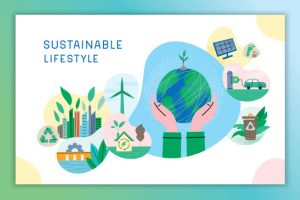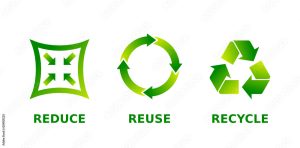Introduction
As we look toward 2025, more people than ever are becoming aware of the impact their daily actions have on the environment. With climate change, pollution, and waste becoming increasingly urgent global issues, adopting a sustainable lifestyle has never been more important. Small changes in the way we live can make a big difference in reducing our carbon footprint and promoting a healthier planet.
In this article, we’ll share some green living tips and eco-friendly lifestyle habits that you can start incorporating into your routine today. These changes will not only help the planet but can also improve your health and save you money. Whether you’re a beginner or already living a more eco-conscious lifestyle, these tips will guide you in living greener in 2025.
What is a Sustainable Lifestyle?

A sustainable lifestyle involves making choices that minimize your impact on the environment while promoting long-term ecological balance. This includes adopting habits that reduce waste, conserve energy, protect natural resources, and encourage responsible consumption. Living sustainably is about more than just cutting down on plastic or driving less—it’s a whole approach to living in harmony with the planet.
Incorporating sustainable practices into your life can be as simple as choosing eco-friendly products, using less energy, or reducing the amount of waste you produce. It’s about making decisions that not only benefit you but also future generations. By focusing on eco-friendly lifestyle changes, you can contribute to a cleaner, greener world.
Why Is a Sustainable Lifestyle Important?
There are many reasons why green lifestyle changes are essential, especially as we head into 2025:
- Climate Change: The earth’s climate is changing, and human activities like burning fossil fuels and deforestation are major contributors. Adopting a sustainable lifestyle helps reduce the release of harmful greenhouse gases.
- Resource Conservation: Natural resources like water, energy, and raw materials are finite. A sustainable lifestyle promotes their efficient use and conservation, ensuring these resources are available for future generations.
- Waste Reduction: Waste is a growing problem, with landfills filling up and oceans becoming polluted by plastic. By living sustainably, you can help minimize waste and reduce the amount of harmful materials that end up in the environment.
- Improved Well-being: Many eco-friendly habits promote better health, like eating plant-based foods, reducing chemical exposure, and being more active outdoors.
In short, adopting a green living lifestyle is crucial for the health of the planet, the future of resources, and the well-being of all living beings.
Sustainable Living Tips for 2025
Now that we understand the importance of living sustainably, let’s dive into some practical tips and eco-friendly lifestyle habits that can help you live greener in 2025.
1. Reduce, Reuse, and Recycle

The three Rs—reduce, reuse, and recycle—are the foundation of sustainable living.
- Reduce: Buy fewer disposable items, such as plastic bottles or fast fashion clothes. Choose products that are long-lasting and of higher quality.
- Reuse: Find ways to repurpose items before throwing them away. For example, use old jars for storage or turn old clothes into rags.
- Recycle: Sort your waste properly and ensure recyclable materials like paper, cardboard, and glass go to the recycling bin.
2. Use Energy-Efficient Products

One of the biggest ways to live more sustainably is by reducing your energy consumption.
- Switch to LED light bulbs, which use less energy and last longer than regular bulbs.
- Unplug electronics when not in use to avoid energy waste.
- Use energy-efficient appliances, like refrigerators and washing machines that have the Energy Star label.
By switching to energy-efficient products, you can reduce your carbon footprint and save money on your utility bills.
3. Adopt a Plant-Based Diet

Eating a more plant-based diet is one of the most effective eco-friendly lifestyle changes you can make. Meat production, especially beef, has a large environmental impact due to the resources required to raise animals and the greenhouse gases they emit.
- Cut back on meat: Start by reducing your meat intake or try going meatless once a week.
- Choose local, seasonal produce: Local fruits and vegetables require less energy to transport, reducing their carbon footprint.
- Grow your own food: If you have space, start a garden. This will allow you to grow your own vegetables and reduce the need for store-bought produce.
Eating more plants is not only good for the environment but can also benefit your health.
4. Use Eco-Friendly Transportation

Transportation is a major source of carbon emissions, so it’s important to reduce how much we drive.
- Walk or bike whenever possible. This reduces your carbon footprint and helps keep you healthy.
- Public transportation: Use buses, trains, or trams instead of driving alone.
- Electric vehicles: If you must drive, consider switching to an electric car or hybrid to reduce emissions.
Reducing your reliance on cars and using eco-friendly transportation is a significant way to help the environment.
5. Choose Sustainable Products

Be mindful of the products you buy. Many items, especially plastic products, contribute significantly to waste.
- Opt for reusable items, such as stainless steel water bottles, cloth bags, and bamboo toothbrushes.
- Support sustainable brands that use eco-friendly materials and ethical production processes. Look for certifications like Fair Trade, Organic, and B Corp.
- Avoid fast fashion: Instead of buying cheap clothes that wear out quickly, invest in high-quality, sustainable fashion that lasts longer.
By making conscious decisions about what you buy, you can reduce the amount of waste you generate and promote a more sustainable economy.
6. Conserve Water

Water is a precious resource that is often wasted in daily life. Here are a few ways to conserve water:
- Take shorter showers: Reducing your shower time by just a few minutes can save gallons of water.
- Fix leaks: Even a small drip can waste a lot of water over time.
- Use water-efficient fixtures: Install low-flow showerheads and faucets to reduce water usage.
Conserving water is a simple yet effective way to live more sustainably.
7. Practice Mindful Consumption

Living sustainably is about being more mindful of what you consume, from food to material goods.
- Buy only what you need: Avoid impulse purchases that lead to waste.
- Repair items: Before throwing something away, see if it can be repaired or repurposed.
- Buy secondhand: Consider buying used items like furniture, clothes, or electronics, which help reduce waste.
Being more mindful about your consumption will help you live more sustainably while reducing your environmental impact.
Conclusion
Living a sustainable lifestyle in 2025 is more achievable than ever. By adopting simple green living tips and eco-friendly habits, you can reduce your impact on the planet and create a healthier, more sustainable future. Whether you’re reducing waste, using energy-efficient products, or eating more plant-based foods, every small change you make adds up to a bigger positive impact on the world around you.




